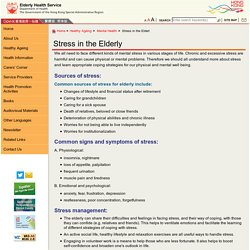

What is Stress? Stress in the Elderly. We all need to face different kinds of mental stress in various stages of life.

Chronic and excessive stress are harmful and can cause physical or mental problems. Therefore we should all understand more about stress and learn appropriate coping strategies for our physical and mental well being. Sources of stress: Common sources of stress for elderly include: Changes of lifestyle and financial status after retirement Caring for grandchildren Caring for a sick spouse Death of relatives, beloved or close friends Deterioration of physical abilities and chronic illness Worries for not being able to live independently Worries for institutionalization Common signs and symptoms of stress: A.
Insomnia, nightmare loss of appetite, palpitation frequent urination muscle pain and tiredness B. Sources of Stress. 'Like a knife poking my heart': Loss, loneliness and the killing pain of elderly depression. SINGAPORE: Linda Loh remembers a time when her 85-year-old mother used to be a “very nice person”. As the tantrums began, at first the family put this down to Mdm Lee Sui Yee’s old age – but then, nothing seemed acceptable to her. “I’d talk to her, but she’d say that I never listen to her,” said her daughter. “I’d try to cool myself down … just walk into the kitchen and stay away from her. But she’d also scold me for not staying and talking to her.” An irritable Mdm Lee would especially be worked up about noise, such as a child crying or anybody talking loudly.
When she had a fall and was admitted to hospital in July 2016, the family found out the truth. After she shouted at the nurses, struggled with them and, at one stage, talked about committing suicide – which she nearly did by trying to strangle herself – she was diagnosed with an episode of Major Depressive Disorder. And her recovery has been slow. “Last time, she liked to listen to music – her operas. I once cried for three days. How One Affects Another. The importance of sedentarism in the development of depression in elderly people. Sedentary Behaviour. Depression in older people. Empathic Intelligence. How stress affects seniors, and how to manage it - The American Institute of Stress. Exercise, breathing techniques, and medication can help you manage stress as you get older.

We all experience a little stress from time to time. It’s not so hard to handle when we’re young. But as we age, coping with stress isn’t as easy anymore. “We tend to have less resilience to stress, and older adults often find that stress affects them differently now,” says Dr. Michelle Dossett, an internal and integrative medicine specialist at the Benson-Henry Institute for Mind-Body Medicine. Changes in response What’s different about coping with stress when we’re older? If you have a chronic disease, which is already a burden on the body, it’s even harder to bounce back physically from the toll the stress response takes.
You may also feel a difference mentally. Changes in triggers When you were younger, your stressors may have been a busy day at the office or a crying child. What you should do If you’re feeling stressed, Dr. Release Stress Through These Steps. Stress Management for Senior Health. Stress management has been associated with increased senior health and well-being.

While retirement seems to be a time of little stress. After all, with job stress that’s been endured for decades out of the picture, one may wonder if there even is stress after retirement — senior stress can still originate from relationships, finances, and retirement itself, as well as from many other areas of life. The following are effective methods of stress management that may be especially conducive to senior health. Meditation Studies on meditation show that it can not only provide relief from stress when it is practiced but can help build a kind of immunity to future stress — your stress response may be triggered less often if you meditate regularly. Cognitive Puzzles Solving Sudoku or crossword puzzles, or working on other thinking games can provide mental stimulation akin to ‘brain exercise.’ Yoga Breathing Exercises. Benefits of Therapy. Stress relief tips for older adults.
Know the symptoms, get the treatment right for you Stress in adults, especially older adults, has many causes.

You may experience it as a result of managing chronic illness, losing a spouse, being a caregiver, or adjusting to changes due to finances, retirement, or separation from friends and family. Fortunately, there are plenty of things you can do for stress relief. Tailor the treatment The type of stress relief that works best depends on what someone is experiencing. If disability is a source of stress, changes in your home may help you live more independently. Tailor-made Treatment.